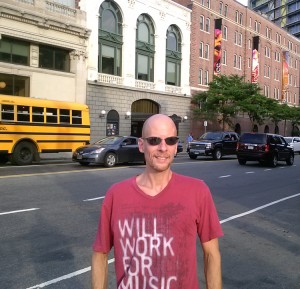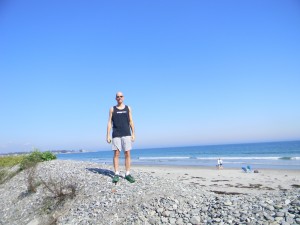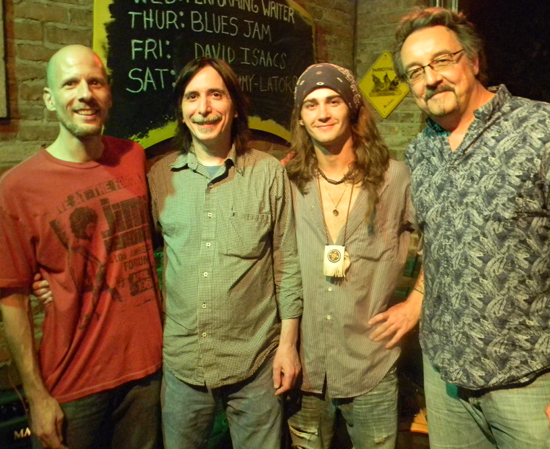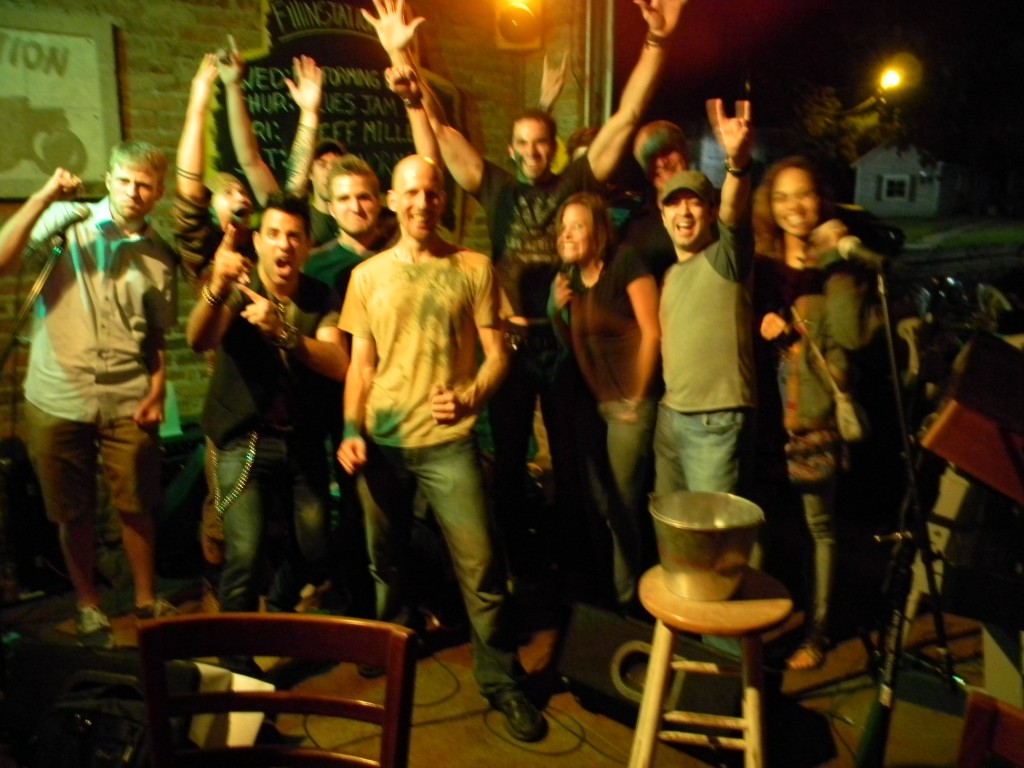Berklee
Music and Art; to Pursue, or Not to Pursue?
By Eric Normand
I recently read an article on Huffington Post, “Art and Music Are Professions Worth Fighting for, and while I agree with some points of this article I think the author does a major disservice in presenting the pursuit of music as a profession in a kind of “all or nothing” approach. He talks about a presentation he made at a high school career day where he suggests music as a possible career choice for young people. He says that those interested should “go for it, with abandon and furious joy, and that you do so without a plan B”. This is where I disagree. I also disagree with the distinction this makes between “career musicians” and nonprofessional musicians. Just because you don’t play professionally doesn’t mean your music isn’t valid. I agree, if you love music and want to pursue it, why not pursue it wholeheartedly, but what’s the matter with pursuing music while earning a living from something else? What’s the matter with pursuing music for the mere enjoyment of it? I believe you can pursue music as a career and for fun, but you need to keep your eyes open and realize that you will need a steady income stream along the way. To decide how music or a music career might fit into your life, perhaps the questions you really need to ask yourself are; why are you pursuing music, what do you want to get out of it, and what will it take to be successful? What is your definition of success?
When I was a senior in high school, if you had asked me what I wanted to be when I grew up I would have said, “a professional musician”. Immediately after high school I got a job as an apprentice drywall carpenter before enrolling in the Berklee College of Music two years later. After Berklee I played professionally in nightclub bands for the next 14 years, eventually also becoming a guitar teacher. In 2002 I relocated to Nashville Tennessee where I’ve had the good fortune to work as a hired gun on several major tours. My first gig was as a guitar tech for Toby Keith, and I went on to play lead guitar with several country artists – Daryle Singletary, Vern Gosdin, Rhett Akins, and the hit songwriting team known as “The Peach Pickers”, among others. I also wrote a book about how to navigate the Nashville music industry, “The Nashville Musician’s Survival Guide”.
Looking back, if you had told that starry-eyed high school kid that one day he would be a musician, painter, drywall carpenter, teacher, author, and website designer, he would’ve said “Naw, I’m not interested in any of that other stuff”. But as they say “life is what happens while you’re busy making other plans”, and one of the things I’ve learned along the way is that you have to wear a lot of hats to survive in this world. The truth is, my original goal of being a professional musician was based on the glamorization of the musical era that I fell in love with, and I had no idea about the reality of any of it.
What do professional musicians do?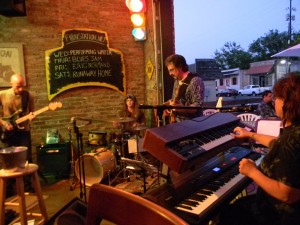
We starve! Just kidding (well, not entirely). The options for musicians trying to earn a living from their craft are somewhat limited. The way I see it you can pursue one or more of the following avenues; nightclub musician, music teacher, touring musician, or session musician. Sure, there are other gigs (orchestra musicians, jingle writing, etc.) but these four are the most practical, and out of these, the first two are the only ones that ever become reality for most. If you want to be a touring or session musician, you will need to live in a music metropolis such as Nashville, New York, or LA, and these are extremely hard (but not impossible) gigs to land.
Regarding paying gigs, I’m talking about work you can get on a regular basis that pays real money for your services. Therefore, I’m leaving out songwriters and aspiring artists because these do not pay any real money unless you become extremely successful. TV shows like “American Idol” and “The Voice” have propelled the myth that anybody that learns how to sing a good cover song can become a national recording artist and superstar. Out of the tens of thousands who audition for these shows and the hundreds that perform on them annually, how many are ever heard from again?
While I cherish many of my experiences as a professional musician, I’ve learned the hard way that it doesn’t always pay the bills. Night club gigs still pay what they paid 25 years ago when I first got into this ($100 a night is still considered good pay) and most club gigs in Nashville don’t even pay that. As far as touring musicians, most tours only pay during the part of the year that the tour is active and, unless you are on a very high profile tour, you’ll have to find another income stream during the winter.
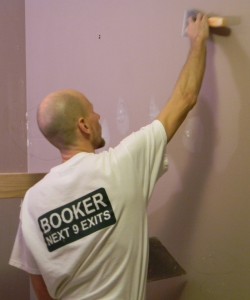 Two years ago, I went back to full-time construction work, and put my music career on part-time status. I began approaching music as simply one component of my life, and for first time since I’ve been in Nashville I’m actually earning a steady living year-round. I still play music, sometimes for pay, always for fun, and I get just as much reward, if not more, out of a local club gig playing for tips as I do when I perform with The Peach Pickers on the Luke Bryan farm tour in front of 15,000 people.
Two years ago, I went back to full-time construction work, and put my music career on part-time status. I began approaching music as simply one component of my life, and for first time since I’ve been in Nashville I’m actually earning a steady living year-round. I still play music, sometimes for pay, always for fun, and I get just as much reward, if not more, out of a local club gig playing for tips as I do when I perform with The Peach Pickers on the Luke Bryan farm tour in front of 15,000 people.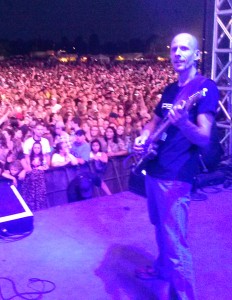
Don’t get me wrong, I’m not here to talk people out of their dreams; after all, I did write a book about surviving the Nashville music industry. But if this is your dream, you need to arm yourself with knowledge and know what you’re up against. If you’re thinking about pursuing music or arts as a profession you must first “define your success”. What is your definition of success in music? Then ask yourself why you want to do this. If it’s because you think it’s an easy and fun way to make a living you might want to do a little more research. It can be fun, but it’s definitely not easy. If it’s because you absolutely can’t see yourself doing anything else, then go for it, but have a plan B, and have a way of earning a living while you pursue it.
There’s nothing wrong with pursuing music as a career, and there’s also nothing wrong with being a musician or artist that never becomes “professional”. Music is one of the oldest forms of communication, music has the power to heal and unite people, and playing music makes you smarter. So go ahead and work at becoming a great musician, it’s a noble thing to do and the world always needs good music and art. Approach your music with abandon and joy, but don’t be afraid to have a plan B.
Follow Eric on Twitter and his blog at survivenashville.com
Eric’s End-of-Summer Blog
I can’t believe summer is drawing to a close! Well, not really…It’ll still be really hot down here in middle Tennessee for at least another month or so. But to me, especially being from the north, Labor Day weekend always feels like the end of summer – kids go back to school, it begins to get colder, the holidays start creeping up, and so on. And it has been a great summer, at least for me. I worked hard, played some cool shows, hosted a couple of Berklee alumni events, took my first yoga class, released a CD of originals with my band “Skinny Buddha” and had an action-packed 10 day trip to New England, during which I gave a clinic and performance at the Berklee College of Music. And most importantly, I celebrated another anniversary with my wife and best friend of 18 years (I think this is the beginning of a beautiful friendship…).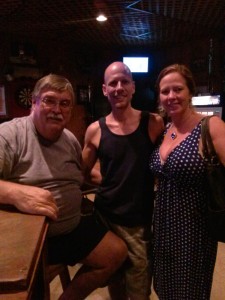
So what’s in store for the fall, you might ask? I’ve got lots going on – I just had the transmission rebuilt in my van, began a new round of P90X, started an herb garden on my back deck, plan to have a yard sale this coming weekend…seriously, I do have a lot of big things in the works.
Skinny Buddha will be the guest artist on “The Mando Blues Radio Show”, with the taping coming up on Monday, November 16, and aired on Wednesday, September 18 on 107.1 FM Radio Free Nashville. Thanks to Whit Hubner from Nashville’s very own “Hippie Radio” we will be rocking the “Mando Blues Tent” with a six song performance. If you haven’t yet discovered it, Hippie Radio is the coolest radio station in Nashville, and you can get a free phone app from their website and listen to them anywhere. Pretty groovy stuff!
Coming up in October, I’ll be playing guitar with “The Peach Pickers” featuring Rhett Akins and Dallas Davidson on the sold out “Luke Bryan Farm Tour”. We did this last year and it was a hoot! This year’s band will consist of Nick Forchione on drums, “G-men” Mike Chapman on bass and Chris Luzinger on guitar, and yours truly on guitar and harmony vocals (for those of you who don’t know, the G-men are an infamous group of Nashville session players who played on all of the Garth Brooks records). Look for us when we come to a farm near you!
On Monday, October 28 I’ll be hosting the last Nashville Berklee Jam of 2013 at The Rutledge with special guest speaker, performance coach, Diane Kimbrough. Diane has coached a wide array of artists ranging from beginners to artists like Shania Twain and Toby Keith. After her talk, she will be critiquing and coaching some of the regular performers from our bimonthly jam. This event is open to the public and should be a great night!
Starting in November, I will be playing some shows with a northern Alabama-based band “The Flashbacks”. Along with Mike Chapman and some other veteran players, I will be digging into a night of 60s and 70s R&B and Motown.
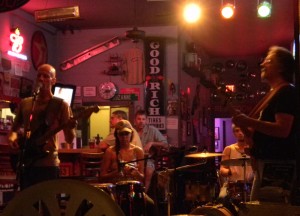 On Wednesday, November 27 Skinny Buddha will be performing a set of Jimi Hendrix music at Nashville’s “Soulshine Pizza” for their special “Jimi Hendrix Tribute Night ” being held on the great guitarist’s birthday. This night will begin with our performance at 9 PM and will conclude with a second show of Hendrix music performed by the legendary, Phil Brown (formerly of Little Feat). This is a great excuse to learn some new Hendrix tunes (well, new to me) and I’m planning on digging into some deep cuts like “Who Knows”, “Hear My Train a Comin’”, “Drivin’ South” and “Stone Free”, in addition to my regular repertoire of Jimi favorites. For any of you that know me, this is an extra special night; one I am honored to be a part of. I first heard Jimi Hendrix at the age of 11, when the sounds of his Woodstock performance of the Star-Spangled Banner sent me on a musical adventure that I am happy to be still exploring.
On Wednesday, November 27 Skinny Buddha will be performing a set of Jimi Hendrix music at Nashville’s “Soulshine Pizza” for their special “Jimi Hendrix Tribute Night ” being held on the great guitarist’s birthday. This night will begin with our performance at 9 PM and will conclude with a second show of Hendrix music performed by the legendary, Phil Brown (formerly of Little Feat). This is a great excuse to learn some new Hendrix tunes (well, new to me) and I’m planning on digging into some deep cuts like “Who Knows”, “Hear My Train a Comin’”, “Drivin’ South” and “Stone Free”, in addition to my regular repertoire of Jimi favorites. For any of you that know me, this is an extra special night; one I am honored to be a part of. I first heard Jimi Hendrix at the age of 11, when the sounds of his Woodstock performance of the Star-Spangled Banner sent me on a musical adventure that I am happy to be still exploring.
And lastly, I am planning to record some more Skinny Buddha music.
That’s about it for now. I hope you all had a great summer and that the fall will bring you much peace and happiness. I guess I’d better go clean out my garage to get ready for the big yard sale!
A New Year, a New Blog, and a Few Other Things
It’s the first week of this brand-new year of 2013 and, not that I believe in New Year’s resolutions, one of the things I’m going to try to do differently in this new year is to get back to blogging more regularly. In that spirit, I also want to learn how to write shorter blogs. Let’s see how I do at my first attempt.
2012 was an interesting year, a lot happened in our world. A long-winded, and divisive election season came and went, it was one of the most extreme years of extreme weather since record-keeping began; our military is still in the midst of several conflicts around the globe; the tragic Sandy Hook shooting in Connecticut terrified us all, gun control is now a national conversation, and Facebook is still here after a disastrous stock market ploy.
I also had a few big moments. I played a handful of shows with The Peach Pickers (Rhett Akins and Dallas Davidson) on the sold-out Luke Bryan Farm Tour (you can read more about that adventure here), I hosted a monthly Berklee Alumni Jam, got to play music with Jack Pearson (read “Jack Pearson at the Nashville Berklee Jam) and Reese Wynans (read “Stevie Ray Vaughan keyboardist, Reese Wynans talks at Nashville Berklee Jam”), I ran in my first-ever 5K road race, met a lot of cool people, listened to a lot of great records, and cooked and ate a lot of good food!
I’m not sure what lies ahead in 2013, I’ve got a lot of big ideas and plans – we’ll see what happens. One thing that’s on my 2013 to-do list is to get out on the town little more often. After 23 years of being a professional musician I found that it’s still easy to get myself off the couch for a gig, but much harder to just go out and hang. I’m going to try to change that. I plan to still host the Berklee Alumni Jam (we are now going to be doing it quarterly). Thanks to my wife, Kelly, I’ve learned to enjoy running, and we are both training for our first half marathon in April. I’m trying to reassert myself into my musical craft, to take another step, and therefore practicing the guitar and vocals daily and learning new material is a top priority. Basically, I’m trying to stay healthy, inspired, and viable, while trying to help a few folks along the way.
So that’s about it for now. Let me know what you’ve got going on and don’t be afraid to drop me a line. I hope this New Year brings much happiness and success to you and your family. Thanks for reading!
Jack Pearson at the Nashville Berklee Jam – August 14, 2011
Guitarist, singer, songwriter, producer and session-musician, Jack Pearson shared some unique perspective about his musical journey with a room full of Berklee alumni and others from the Nashville music community last Tuesday. The Nashville Berklee Jam, held monthly at the Fillin’ Station in Kingston Springs, saw some new faces and old friends on this special night, and Jack’s decades of experience as a world-class musician provided a rare peek behind the curtain for all those in attendance.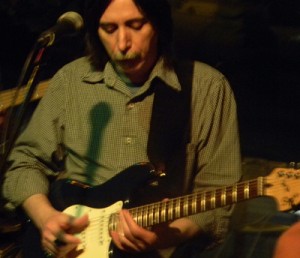
Jack’s musical career began in the mid 1970’s, when he played in multiple bands and logged his first recording session at age 16. In 1993 the Nashville native began his relationship with The Allman Brothers Band as a sub for Dickey Betts, eventually becoming a member of the ABB from 1997-1999 and also touring with Gregg Allman & Friends. Over the years he’s also worked with Vince Gill, Delbert McClinton, Jimmy Buffett, Earl Scruggs, Bobby “Blue” Bland, Amy Grant, Faith Hill, Gov’t Mule, Buddy DeFranco, and countless others.
Jack began his part of this night by playing some beautiful sketches of “I Can’t Get Started”, and for those who have never heard him play, his ability to transport an audience through time and space with nothing other than an unaccompanied electric guitar became quickly apparent. Following the spontaneous applause, Jack cut straight to some Q & A. One of the first questions asked was about his guitar, and I found it interesting that the deep, rich tone coming out of our backline Fender Deluxe originated from a Fender “Squire” Stratocaster, which he had recently bought for $100 at a pawn shop. Plugged into nothing other than a lone tube screamer, this drove home the point that great tone comes from within.
Learning from his oldest brother, Jack was exposed to rockabilly and blues as a teenager and explored the music of Chuck Berry, The Ventures, and Carl Perkins at a young age before eventually discovering jazz greats like, Wes Montgomery, Django Reinhardt, and Charlie Christian. Learning from friends, other musicians, and records, he slowly pieced together his musical vocabulary. He shared some thoughts on how to approach a II-V turnaround, demonstrating some different voicings and melodic approaches, underscoring the importance of putting song and melody above the technical understanding of modes and scales.
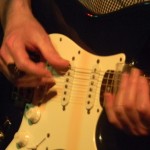 “It takes a lot of experimenting… a lot of guys come to me that get out of school and they say, “when I hear this chord I’m supposed to play this mode and scale”, and it locks them up. They can’t make any melodies because they’re told to play a mode or a scale.”
“It takes a lot of experimenting… a lot of guys come to me that get out of school and they say, “when I hear this chord I’m supposed to play this mode and scale”, and it locks them up. They can’t make any melodies because they’re told to play a mode or a scale.”
This simple, but prophetic thought resonated, and I had flashes to a time in my life when I over analyzed the music I played. Jack drove this point home with “…it comes down to the chord and the melody and where it’s going to…”
He went on to talk about the blending of styles and how he went through different periods of his life where he would be deeply immersed in a singular style for a few years – Delta blues, jazz, etc., and that after a while, all these different styles started coming together. Not afraid to take some chances musically, he demonstrated how he might go from a Howlin’ Wolf lick to a Charlie Parker lick within the same phrase, and that while some players will say this is wrong, he believes that “the main thing is to get the music out, and play with feeling.”
In response to a question about some of his best and worst gigs, Jack said that some of the worst gigs are when people don’t listen, and the music that you play with somebody is more important than the venue, or how famous somebody is.
He explained how learning all of the Allman Brothers songs as a kid helped put him in the position to sub for Dickey Betts on an early 90s Allman Brothers tour, which led to some recording with Gregg Allman and eventually to a phone call from Greg in which he was asked if he wanted to join the Allman Brothers band.
He candidly shared how this landmark gig damaged his hearing, causing an already existing case of Tinnitus to worsen, ultimately forcing him to leave the gig, perhaps sooner than he otherwise would have.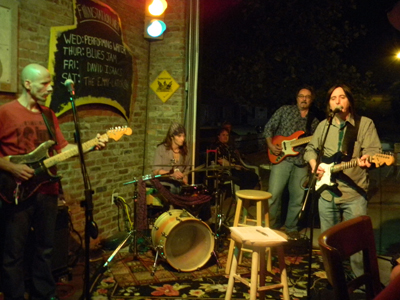
“There’s really no way to describe how loud it was on stage…Dickey Betts wasn’t in the PA…he was 135 dB side stage…”
As a fellow tinnitus sufferer I completely related to this portion of his talk and gained some new perspective as he explained that, despite wearing earplugs, extreme SPL’s (sound pressure levels) can still do damage, as the sound can affect your inner ear by entering your nose, mouth, and through your bones.
In response to a question about life lessons learned through music he answered, “Try not to take music for granted, it’s so special, and you can reach so many people…lyrics can encourage you, relate to your pain, but you can also do it with notes.” He demonstrated this by showing how the same group of notes can sound happy, or sad depending on where the emphasis is placed. He talked about the endless possibilities of how you can play even a single note, demonstrating this concept by playing a huge range of variances on a high “G” note.
After Jack’s talk concluded he played a short set with our Alumni House Band, the air becoming filled with the sounds of spontaneous applause after each inspired performance. Jack left shortly after his set, and the other alums in attendance continued jamming into the night. I, and everyone else in attendance would like to extend our appreciation and gratitude to Jack for sharing his music and journey on this special night!
Our next Nashville Berklee Jam will feature country music artist and hit-songwriter, Rhett Akins on Tuesday, September 11 at The Fillin’ Station. For more info, go to www.nashvilleberkleejam.com.
The Nashville Berklee Jam Goes Public
Today I want to tell you all about an exciting monthly event I have been hosting – The Nashville Berklee Jam, and its new accessibility to everyone in the Nashville music community. The beginnings of this idea came to me a few years ago when I first attended the annual Nashville Berklee Alumni Reception. On my way home that night, I remember thinking how great it was to meet so many musicians in one night who were so passionate about their musical ambitions and so hungry for knowledge. These musical comrades were a mix of Berklee alumni residing in middle Tennessee and Berklee students who came down for the annual Nashville field trip. At this reception I made connections with other like-minded alums and students who came down on the field trip, the latter peppering me with questions about my experiences in Music City. This event was a very stimulating night as the energy of three hundred musical minds meeting and conversing seemed to create an air of camaraderie and untapped potential! Then I went home and another year passed before I got this fix again.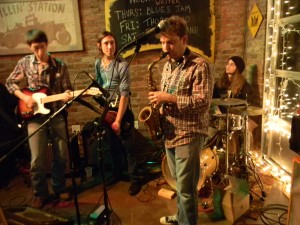
So this past winter I decided to create a monthly event to try to emulate this musical networking hoedown on a smaller scale, and The Nashville Berklee Jam was born. Held on the first or second Tuesday of the month from 7 PM to 11 PM at The Fillin’ Station in Kingston Springs, TN, these events start out with an informal meet and greet, followed by a Nashville music industry guest speaker, and end with an open jam. So far the reception has been very positive, here’s a recap (with links to their corresponding blogs):
February – A-list session bassist, Mike Chapman gave a great talk about being a session musician, outlining key concepts in what he calls, “the essential slices of the session player pizza”. He also jammed with several alums after the talk.
March – award-winning vocal coach, producer, and hit songwriter, Judy Rodman gave an insightful talk about career paths for vocalists. She also performed a couple of songs with the house band and then critiqued and coached several vocal performances, helping vocalists make instant improvements.
April – Stevie Ray Vaughan keyboardist, Reese Wynans shared his fascinating story about being a lifelong-career musician, the life-changing moment that came on his last night with Delbert McClinton that landed him the SRV gig, and the whirlwind years that followed. After his talk, he joined us for a few inspired performances.
May – fellow alum, musician, and author of “The Nashville Number System”, Chas Williams gave an introductory class on this subject. After the class, he charted one of alum, Sarah Tollerson’s originals and performed it with Sarah and the house band with everybody reading the chart off a dry erase board.
June – drummer, producer, and clinician, Rich Redmond gave an inspiring talk on “Navigating the Nashville Music Industry” speaking candidly about his early “lean years” in Music City and different approaches to finding success here. After his talk he sat in for a few tunes and stuck around to chat with others in attendance.
For our next event, to be held on Tuesday, July 10, I will be giving a talk that continues last month’s theme – “Navigating the Nashville Music Industry – Part Two”, during which I will explore some of the concepts I write about in my book “The Nashville Musician’s Survival Guide”. And, this just in, for our event in August we are proud to announce that the guest speaker/performer will be none other than Nashville guitar ace, Jack Pearson, formerly of the Allman Brothers, Vince Gill and many others.
All of the guest speakers have given great talks, sharing their knowledge and providing inspiration, and these talks have been interactive with many great questions and comments from alums. My band, Skinny Buddha (comprised of Berklee alumni and others from the Nashville music community) provides backline and a starting point for the laid back jams which have covered everything from originals to classic rock to blues tunes to two-chord jams. All of these events have been great friendship building and networking experiences for all involved, as well as educational. So far, the attendance has been mostly comprised of Berklee alumni, but as there seems to be a growing interest from others in Nashville, we are now officially making this event open to the Public. Nashville is a diverse and complex music community in which a Berklee alumni community also resides, and it is my goal to help these two worlds intersect and meld together.
So come on out to our next “Nashville Berklee Jam” On Tuesday, July 10. I hope to see you there!
P.S. if you have any comments, thoughts, or questions, please feel free to e-mail me at eric@ericnormand.com.
Nashville Berklee Jam with Rich Redmond – June 5, 2012
The latest Nashville Berklee Jam last Tuesday was a great success, thanks to all who attended! The weather was beautiful, so we had a very laid back talk outside on the patio at The Fillin’ Station, our usual location for this event. Rich Redmond, the guest speaker on this night, has worn a lot of hats during his 15 years in Nashville – session/touring drummer, producer, clinician, public speaker, and his hour-long talk gave all in attendance some great perspective into different ways to navigate the Nashville music industry.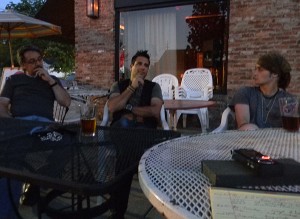
Rich spoke of the need to aggressively market yourself to find work in Nashville and how in his earliest days he obtained work by handing out demo cds of his drumming abilities to almost everyone he would meet around town. He candidly talked about those ‘lean years’, and that long before he was recording on hit records, touring the world with Jason Aldean, and producing acts like ‘Thompson Square’, he was hustling gigs on Broadway, playing in corporate party bands – whatever was necessary to insure survival.
For those who are just starting out in Nashville, he recommended that musicians “take every gig that’s offered”, as every new gig can potentially lead to new relationships and different career opportunities and that “If you give more to people then they expect, if you consistently exceed expectations, people are going to want to work with you.”
He spoke of the need to be ultra-professional by “always returning phone calls in a timely manner, always returning e-mails in a timely manner, being professional, being flexible, having the right gear to do the job and never mailing in a performance…”
Regarding the importance of reputation he said “You can have a great website, you can Tweet 1000 times a day, you can have a fantastic business card that’s got the really good paper, you know the really firm stuff that you have to pay extra for, and it’s still going to come down to word-of-mouth. In this [digital] age it’s so easy to be talked about in a positive or negative way, globally.”
During one part of the talk he mentioned a concept he refers to as “CRASH” a phrase he coined that stands for Commitment, Relationships, Attitude, Skill and Hunger – the five key ingredients he believes are necessary to succeed. He also spoke of the importance of defining your own success, a concept I talk about in my book “The Nashville Musician’s Survival Guide” (coincidentally, Rich contributed to the writing of this book).
After fielding several questions, he finished his talk and we all headed inside to make some music. Everyone who wanted to jam got a chance to sit in, and several great performances took place – ranging from classic rock covers to blues jams to originals. Rich stayed till the end making himself accessible to anyone who wanted to hang and chat, and during the middle of the jam he got behind the drum kit and played a few songs with me and several other alums. Here’s an MP3 of us playing a spirited version of the Jimi Hendrix classic, ‘Little Wing’ Little Wing Berklee Jam w Rich Redmond low. The night ended and we all headed home, but not until gathering for a group photo.
I want to thank everybody who came out and participated to make this another great event, see you at the next one! The next Nashville Berklee Jam will be held on Tuesday, July 10 – check back in a few days for info on the guest speaker for that night.
Stevie Ray Vaughan keyboardist, Reese Wynans talks at Nashville Berklee Jam
Some of my earliest childhood memories are of my dad playing records and, dare I say, reel to reel tapes of the music of Paul Butterfield, John Lee Hooker, Santana, and Derek and the Dominoes. I guess this music made an impression, because by my early teens in the early 1980’s I was buying my own records, not of the pop-based FM radio music of my generation, but of the previous generations more blues-based artists. While everyone else was listening to E.L.O. and Michael Jackson, I was discovering Jimi Hendrix, the Allman Brothers, BB King and Bobby Bland. Sure, I liked some of the 80’s guitar rock of the day, but always kept digging back to a more rootsy sound. Then right smack in the middle of 80’s hair band mania came Stevie Ray Vaughan, and I immediately related to his music.
Stevie’s music influenced a generation of guitarists and, at a moment where rock and pop music was winding itself up, almost single-handedly brought blues music back into the light. You couldn’t go see a club band during the late 80’s and early 90’s without hearing his music. I found myself covering his renditions of blues classics like “The Sky Is Cryin’”, “Empty Arms”, as well as originals like “Cold Shot” and “Walkin’ the Tightrope”, as did many others at that time. Stevie’s instrumental “Riviera Paradise” from the album ‘In Step’ is a beautiful piece of American roots music, and I always loved the spooky vibe created by his magical band on that song in particular.
I’ll never forget the day I heard of his tragic passing, how sad it was that we had to lose such a wonderful artist at such a young age. But his music, and the influence of his music, lives on, and I, like many others, will always appreciate everything Stevie did for music, and everything his music has done for the world.
So that’s why when I began hosting the Nashville Berklee Jam I felt compelled to 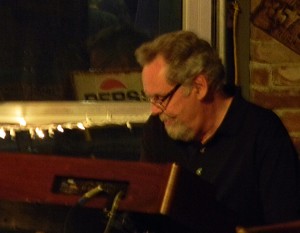 have Reese Wynans, the keyboardist who played with Stevie for the last five years of the great guitarist’s life, as a special guest speaker/performer. Reese was kind enough to share his story with me and a room full of alums at our monthly Nashville Berklee Jam last Tuesday at The Fillin’ Station.
have Reese Wynans, the keyboardist who played with Stevie for the last five years of the great guitarist’s life, as a special guest speaker/performer. Reese was kind enough to share his story with me and a room full of alums at our monthly Nashville Berklee Jam last Tuesday at The Fillin’ Station.
Almost 20 years before he began working with SRV he was playing in cover bands in his home state of Florida, and he recounted one of his first bands playing five sets a night, six nights a week. Two of the other members were Dickey Betts and Berry Oakley and on their one day off they would play a weekly free jam, adding Duane Allman and Butch Trucks to the mix. Eventually Duane decided to start his own band and stole these key members to form The Allman Brothers.
After spending a few years in San Francisco and working with a still-unknown artist at this time, Boz Scaggs, he returned to Florida for a brief period and then worked the East Coast in a show band for a few years. Reese then migrated to Austin, Texas, a booming town full of blues-infused music by this point of the mid-70s. Of this time, Reese spoke passionately.
“It was really great for me living in Austin…everything was so rootsy…they had a great music scene back there in the 70’s. They had a great blues scene, and a great blues club called ‘Antone’s’…and I would go and sit in at Antone’s anytime I had a chance. I was ending up really lovin’ the blues during this time.”
By 1980 he found himself working for Delbert McClinton, playing on four of his records and touring extensively for the next five years. By 1985, Reese was ready to get off the road, and would have if not for a fateful encounter at the end of his final gig with Delbert. Apparently, Delbert’s sax player had been invited to play on one song of a Stevie Ray Vaughan recording session after Delbert’s concert, and at the last minute Reese was asked to join in as the other keyboardist did not show up. Things went very well at this particular recording session, one which produced the hit, “Look at Little Sister” and Reese was asked to come back and record the following day. By the end of that recording session he was asked if he wanted to join the band. Reese summed up a life lesson from this critical moment,
“When a door opens for you, you’ve got to be willing to walk through it, and then be able to deliver once you get through there.”
The next five years would yield three Grammys, several world tours, and a reintroduction of the blues to the masses –
“We were spokesman for Texas blues…as much as Stevie didn’t want to, BB King had to open for us, because we were just more popular than him. He said “no we can never, BB’s always closing the show”… but finally, we had to headline…I loved playing in that band…we were all totally immersed in the blues, and we felt like were the vanguard of the blues. We were dragging Buddy Guy and Otis Rush into the light and presenting them out on our shows to people who were just hungry for that music…the stuff that we played I thought was shining a light on all the huge blues guitar players that had come before us, and that was a wonderful thing to do, I felt like it was really worthwhile.”
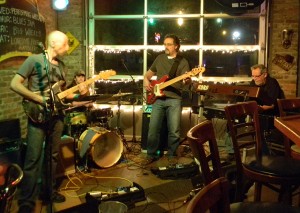 After Stevie’s tragic passing, Reese wound up in Nashville, TN, a place where he has continued to record and perform on a national level. During the talk, Reese passed around his All Music Discography, which reveals a staggering body of work, including Brooks and Dunn’s 2006 single of the year “Believe”. He offered us some thoughts about the differences between studio and live performance –
After Stevie’s tragic passing, Reese wound up in Nashville, TN, a place where he has continued to record and perform on a national level. During the talk, Reese passed around his All Music Discography, which reveals a staggering body of work, including Brooks and Dunn’s 2006 single of the year “Believe”. He offered us some thoughts about the differences between studio and live performance –
“I like being in the studio, I like playing gigs, I like playing clubs…all you people who do studio work know it’s two different things. Playing a club is really a chance to experiment…a chance to reach out in different directions and really find yourself. The studio isn’t really a place for that. The studio is where you don’t have to play it safe, but you’ve got to do something that’s exactly right for the 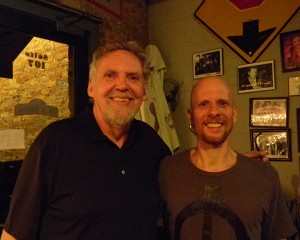 song…it’s a place for finding something that works, finding something unique that works.”
song…it’s a place for finding something that works, finding something unique that works.”
After his talk was finished, Reese was gracious enough to perform a set with our house band – a performance that was nothing short of inspired. I’ve heard his playing on many records, but there’s something intangible that you can feel in the heat of live performance that goes beyond a recording, and that was evident on this night. One of the songs we played together was “Little Wing”, a song that he had played on tour with Stevie, back in the day. On this song, Reese seemed to really stretch out in one of those magical musical moments in which time seems to stand still (see video below).
Eventually, this special night had to end, and we said goodbye after a quick photo op. Thanks, Reese, for sharing your wisdom, and for continuing to shine some light on that crown jewel of American music we call the blues.
Nashville Berklee Jam with Judy Rodman – March 6, 2012
Our second “Nashville Berklee Jam” at The Fillin’ Station in Kingston Springs this past Tuesday was a great success! The guest speaker on this night was none other than Nashville’s award-winning vocal coach, Judy Rodman. Judy has played many a role in the Nashville music industry 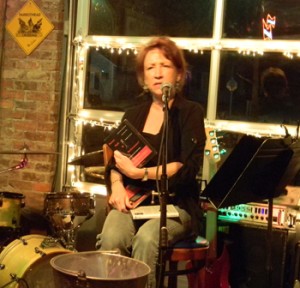 over the years – recording artist, A-list session singer, producer, hit songwriter – and on this night her talk focused on different career paths for vocalists. Judy was involved in the writing of my book “The Nashville Musician’s Survival Guide” and, backing up my theory of the necessity to “wear a lot of hats”, she talked about multiple streams of income for today’s musicians and artists. Among the potential jobs for vocalists she outlined were artists, live singers, and session singers (jingle singers, background vocals, demo singing, and voiceovers).
over the years – recording artist, A-list session singer, producer, hit songwriter – and on this night her talk focused on different career paths for vocalists. Judy was involved in the writing of my book “The Nashville Musician’s Survival Guide” and, backing up my theory of the necessity to “wear a lot of hats”, she talked about multiple streams of income for today’s musicians and artists. Among the potential jobs for vocalists she outlined were artists, live singers, and session singers (jingle singers, background vocals, demo singing, and voiceovers).
Here are a few excerpts:
“Recording artists need vocal ability, because the mark is up. Even with pitch fixing, rhythm fixing…your vocal needs to be as good as it possibly can be because it’s going to sound more natural and it’s going to be more emotionally compelling…You also need a ‘unique artist definition’…it’s not good enough to be just another great singer…you really need to be unique and find your own definition as an artist – your uniqueness, your vocal uniqueness – which means you need to explore your whole voice and your life experiences that you’re going to put into your art. The sound of your artistic definition is going to have to do with the sound of your voice, the choice of your instrumentation, and your message… Artistic definition takes exploration. For those of you wanting a career as a recording artist I would say don’t shortcut your experimentation.”
“For live background singing – you need to have the ability to trace and completely blend and go with the nuances of the voice of the singer you are looking to back…You’ve got to be able to change your sound as the artist wishes…you will of course have to have the ability to sing harmony parts and hear them… you have to have a specific look – whatever the artist is looking for. You need to network and find out who is gigging, who is in need of background vocalists.”
“Session singing…You need great vocal technique, usually you’ll need some vocal training…you really need to have surgical control of your voice for pitch, sound, blend and nuances –because time is money in the studio…You need to of course hear harmony parts quickly, you need to have the ability to read manuscript…but you also need to know the Nashville Number System.”
Judy then gave some practical vocal technique tips before answering several questions from alumni. Click on the following links if you would like to hear her talk in its entirety.
Judy Rodman Talk – Part One (21 min)Judy Rodman Talk – Part 1 (21 min)
Judy Rodman Talk – Part Two (21 min) Judy Rodman Talk – Part 2 (21 min)
There is also a ton of useful and practical information for vocalists at Judy’s website www.judyrodman.com.
When her talk concluded we began the jam portion of the evening with our house band backing Judy for two songs to start things out. Her second tune, “One Way Ticket”, was a number one hit she wrote that was cut by LeAnn Rimes. Judy’s vocal performance was emotionally 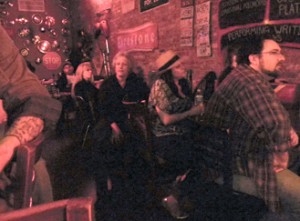 charged and inspiring to say the least, and this set the tone for the rest of the evening. A special dynamic on this night was the “optional vocal performance critique” that Judy offered for willing participants. To break the ice, I decided to go first and sang my two songs with the house band. After my first song, Judy pointed out some of the strengths about my performance and addressed a few things to work on.
charged and inspiring to say the least, and this set the tone for the rest of the evening. A special dynamic on this night was the “optional vocal performance critique” that Judy offered for willing participants. To break the ice, I decided to go first and sang my two songs with the house band. After my first song, Judy pointed out some of the strengths about my performance and addressed a few things to work on.
The jam continued with several great performances. Brian Lucas, the house keyboardist, sang a great rendition of “Georgia”, for which he took the vocal critique option. This pattern continued for the rest of the night, with literally every vocalist asking for a critique. Among these were Ted Schempp, the vocal duet “Acklen Park” (performing songs they co-wrote with alum, Shantell Ogden), Sarah Tollerson, and Michelle Lambert – all performing original 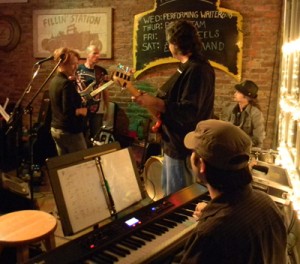 material. After the first song by each performer, Judy offered critiques and then we would try a part of the song again, seeing instant improvement in the vocals (don’t get me wrong, the vocal performances were pretty strong to begin with). Alums, Elton Charles on drums and Rick Carizales on guitar, also sat in and did a fine job backing up some of the guests. Brian Lucas made a big contribution by charting out many of the songs in advance, and Shantell helped out by taking photos and some great video excerpts (see below).
material. After the first song by each performer, Judy offered critiques and then we would try a part of the song again, seeing instant improvement in the vocals (don’t get me wrong, the vocal performances were pretty strong to begin with). Alums, Elton Charles on drums and Rick Carizales on guitar, also sat in and did a fine job backing up some of the guests. Brian Lucas made a big contribution by charting out many of the songs in advance, and Shantell helped out by taking photos and some great video excerpts (see below).
It really was a special evening, fun was had by all and I think everybody learned a few things too. I want to thank Judy Rodman, our house band (Heston Alley on drums, Tom Good on bass, Brian Lucas on keys) and all the alums who participated and helped make this a special evening, I can’t wait for the next one!
The next Nashville Berklee Jam will be held on Tuesday, April 10th at the Fillin’ Station with special guest, Reese Wynans, formerly of Stevie Ray Vaughn & Double Trouble. His talk will share perspective on being a lifelong career musician, working with SRV, and the importance of understanding blues and roots music. Please check our website regularly for updates.
A Big First Night for the Nashville Berklee Jam!
Last night’s “First Tuesday of the Month Nashville Berklee Jam” was a huge success! The otherwise quiet Nashville suburb of Kingston Springs came alive as the alums began filtering into The Fillin’ Station for this night of camaraderie and music.
The mission of this monthly event is to help build our Berklee community in Nashville, and for the first hour, old friends reunited and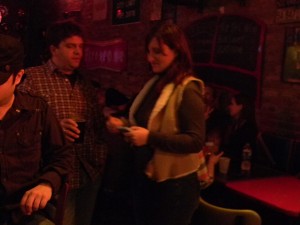 new friendships formed over lively conversation in this quaint setting. Shortly after 8 pm I made a few brief announcements before introducing the night’s guest speaker, A-list session bassist, Mike Chapman.
new friendships formed over lively conversation in this quaint setting. Shortly after 8 pm I made a few brief announcements before introducing the night’s guest speaker, A-list session bassist, Mike Chapman.
Mike’s talk centered on his lifelong career as a session player and he compared what he considers the key ingredients to being a successful studio musician to slices of a pizza.
The essential slices of the “session player pizza” include:
- Talent and Skill
- Positive Attitude
- Strong Work Ethic
- Flexibility
- Taste
In talking about the support role that musicians play on a recording, Mike commented “there’s a big difference between something that is fun to play, and something that is fun to listen to”, noting that they are not always the same thing. He also added that “musicians, both live and in the studio, are essentially in the service industry, and it’s our job to provide the window dressing to the song or artist”. Another point he couldn’t drive home hard enough was how essential it is to know “The Nashville Number System”, as this is the main way songs are charted in Nashville, again, both live and in the studio, and the book bearing the same title by Chas Williams is a great way to learn.
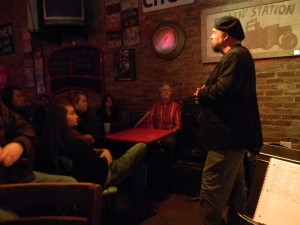 After Mike answered some questions from several alums it was time for some music. To get things started, I took the stage with our house band, consisting of Mike on bass and fellow alums, Heston Alley on Drums and Brian Lucas on Keys. We started out with a spirited version of Freddy King’s “Key to the Highway”, Paul Butterfield’s “Born in Chicago” (featuring bar owner, Patrick Weikenand on harp) and one of my favorites, “Ain’t Wasting Time No More”.
After Mike answered some questions from several alums it was time for some music. To get things started, I took the stage with our house band, consisting of Mike on bass and fellow alums, Heston Alley on Drums and Brian Lucas on Keys. We started out with a spirited version of Freddy King’s “Key to the Highway”, Paul Butterfield’s “Born in Chicago” (featuring bar owner, Patrick Weikenand on harp) and one of my favorites, “Ain’t Wasting Time No More”.
Our next grouping featured Ted Schemp on guitar and vocals and Elton Charles, a recent arrival to Nashville, on drums, and we played one of Ted’s originals followed by an instrumental blues jam. Sofia D got up and played some funky drums behind George Wong on bass and Ben Graves on guitar and vocals. Ben led us through a cool version of the Sam Cooke classic “Cupid” before Sarah Tollerson, host of another Alumni event, “Strength in Numbers” (held on the second Wednesday of each month at the Riverfront Tavern in downtown Nashville) joined us to sing “Oh Darlin’” and “You Make Me Feel like a Natural Woman”.
Michelle Lambert, another recent newcomer, brought charts for a couple of originals and delivered some emotive vocals interspersed with some fine fiddle playing to a couple of arrangements on the fly. Bassist, Keiffer Infantino got into the mix with another recent arrival, guitarist Rick Carrizales, and at this point Ben Graves came back up to play some sax. We played a funky jam in A minor and everybody got to stretch out before our final tune of “Freddy the Freeloader”, for which Mike Chapman got back up to finish the night.
If there’s one thing I have learned from all of the alumni events I have attended, it would be that Berklee alums are some of the nicest people you’ll ever meet. And that open, warm feeling was evident in both the conversations and music that took place on this cold February night. I would also add enthusiasm to this list of traits, as there was an infectious, electricity in the air during these performances.
This jam was our first of many to come, as this will be held on the first Tuesday of each month, and the Nashville Berklee Jam website will serve to keep alums informed about future jams and all of the upcoming Nashville alumni events. I would also like to encourage interactivity on this site, so don’t be afraid to post, comments, songs you would like to play or any other ideas you may have. On that note, I’m looking for volunteers to take photos and possibly shoot a few video clips of our next jam for future blogs.
Thanks again to all those who participated in making this night a great success and see y’all at the next one!
For those who are new to Nashville, or considering relocating to Music City, my book “The Nashville Musician’s Survival Guide” is a street level perspective of the music related jobs found here, and the ultimate companion for today’s musicians, songwriters and artists. Decades worth of information learned on the streets of Nashville for $20! How can you go wrong?
“New to Nashville” Berklee Alumni Reception
Berklee is alive and well in Nashville! On Monday, November 7 we had our first “New to Nashville” Berklee alumni reception at the NSAI studio on Music Row, and the event was a huge success. Upon the suggestion of Berklee Alumni Affairs Officer, Karen Bell, I put this event together to welcome alum’s who recently relocated to Nashville.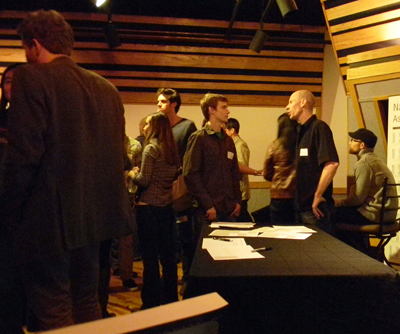
The reception was a three stage event. The meet and greet gave recent transplants a chance to reconnect with their fellow classmates while forming new relationships with some of the alumni who have already been here a while. From what I could tell, out of the 40 or so in attendance, at least half were new arrivals.
After about an hour, everybody took their seats and I gave a brief talk about my Nashville experiences. The talk evolved into a pretty good group discussion, with lots of questions about networking in Nashville. Most of my experience in Nashville has been in the areas of touring, gigging around town, and recording, and most of this discussion centered on these issues.
One alum asked about what clubs and situations would lend themselves for sitting-in with bands. Sitting-in is a great way to build your reputation while making connections that might lead to gigs, and I mentioned a few that are worth checking out – The Fiddle and Steel has a player-friendly jam every Tuesday night; Douglas Corner has “The Loud Jazz Players Jam” every other Monday night; and there are also a few blues jams around the city including one at Carol Ann’s Café on Sunday nights, and The Fillin’ Station on Thursday nights. I also suggested becoming a regular at some of the clubs on Broadway, as this is also a good place to meet players who are gigging regularly.
Rich Redmond, one of the contributors to my book “The Nashville Musician’s Survival Guide”, has one piece of great advice he gives to players who are new to town, and I passed this advice on in response to a question about evolving a music career in Nashville – “Be patient, and take every gig that is offered”. Every gig will potentially lead to more gigs, and no matter how unimportant some gigs might seem, you never know where those roads might lead.
We paused briefly after my talk to give everyone a chance to stretch their legs and grab some more 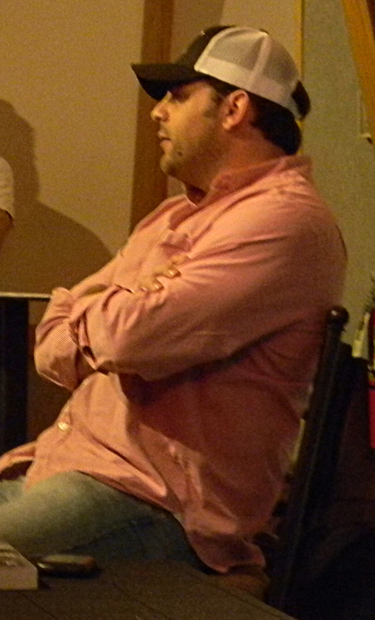 refreshments. Then everybody settled back down into their seats and I proudly introduced the night’s final speaker – country music artist, hit songwriter, BMI songwriter of the year, and my current boss, Rhett Akins. For those of you who aren’t in the know, Rhett is currently one of the hottest songwriters in Nashville, and he shared some great perspective, stories, and advice for all of the songwriters in the room (and judging by a show of hands a little earlier, at least half of those in attendance had come to Nashville to pursue careers in songwriting).
refreshments. Then everybody settled back down into their seats and I proudly introduced the night’s final speaker – country music artist, hit songwriter, BMI songwriter of the year, and my current boss, Rhett Akins. For those of you who aren’t in the know, Rhett is currently one of the hottest songwriters in Nashville, and he shared some great perspective, stories, and advice for all of the songwriters in the room (and judging by a show of hands a little earlier, at least half of those in attendance had come to Nashville to pursue careers in songwriting).
After Rhett’s brief talk about his evolution as a songwriter and artist he also engaged in a group discussion. He spoke candidly about different aspects of being a Nashville songwriter. The Nashville uniqueness of 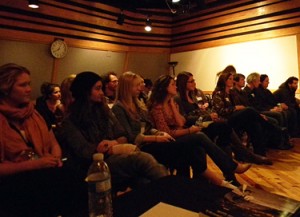 co-writing, the pros and cons of publishing deals, and his lifelong passion for music and songwriting were some major talking points.
co-writing, the pros and cons of publishing deals, and his lifelong passion for music and songwriting were some major talking points.
Some of the perspective he shared that I found most interesting was the sheer number of songs that he writes, stating “I pretty much write at least one song everyday” and that to wind up with five hits songs, he’s probably written 500 songs. He also said that he and his co-writers try to finish a song during each writing appointment, but that he is also interested in experimenting with writing some songs over a longer period of time, noting that “it took Gregg Allman three years to write Melissa”. After his talk concluded he stuck around for a while, giving those who were interested a chance to speak with him one-on-one.
All in all, the event accomplished what we had set out to do. Some of the newest arrivals to Nashville got a chance to reconnect with former classmates that they didn’t even know had moved here, others made new friendships, and many, myself included, got new insights into the ever-changing world of the Nashville music biz’.
I would like to send out a special thanks to the following people for helping make this event a success: Rhett Akins, Karen Bell, Emily Dufresne, Dave Petrelli, Meg O’Brien, NSAI, Berklee, Heston Alley, and Kelly Normand.
Epilogue: I met with Alumni Programs Officer, Emily Dufresne the following afternoon for coffee, and we discussed an idea I had about organizing a monthly “Berklee Alumni Networking Jam”. More info on that will be coming soon!
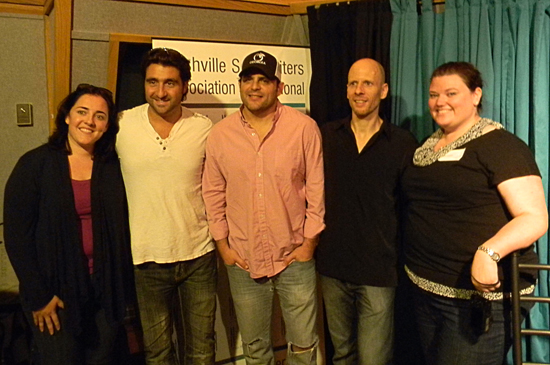 From left to right: Meg O’Brien, Dave Petrelli, Rhett Akins, Eric Normand, Emily Dufresne
From left to right: Meg O’Brien, Dave Petrelli, Rhett Akins, Eric Normand, Emily Dufresne

